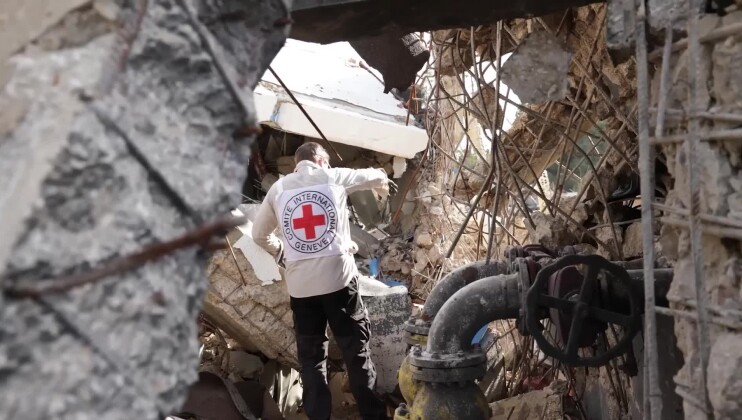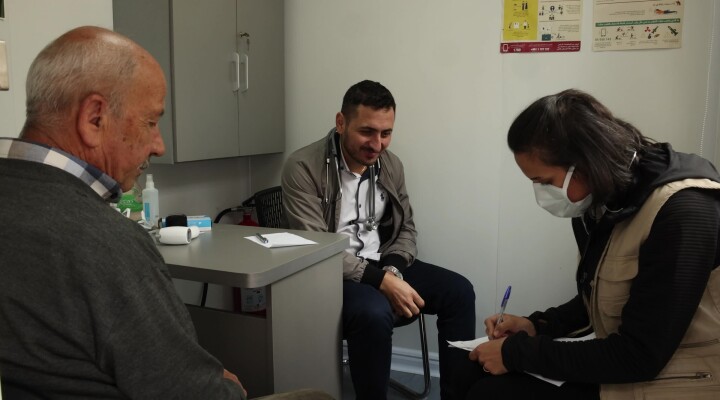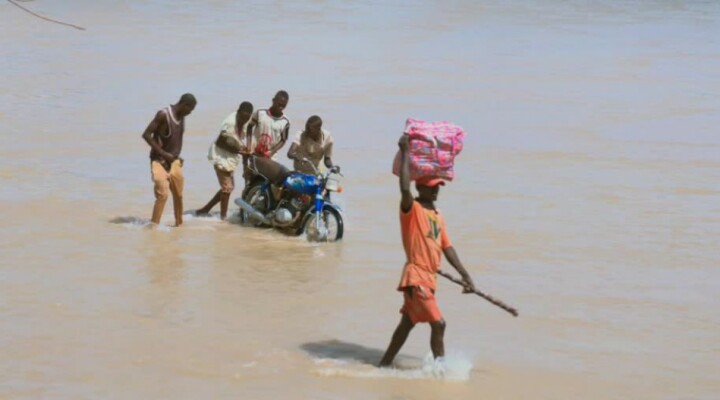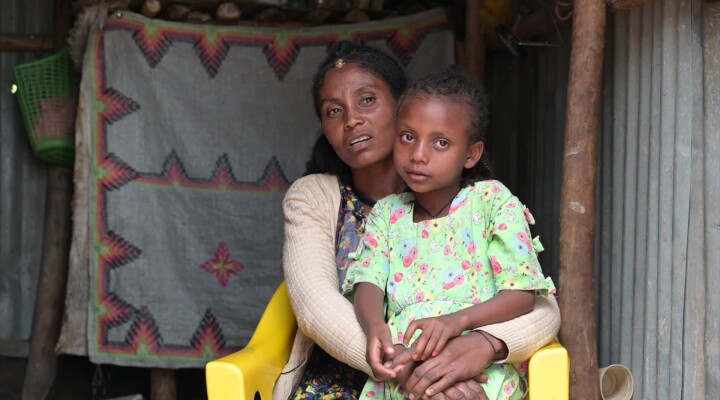Yemen: Conflict leaves millions of children without proper education
Sana’a (ICRC) – After nearly eight years of armed conflict, Yemen is experiencing a crisis in education. Over two million children are out of school and countless others are growing up with uncertain access to education. Given the importance of education in supporting Yemen’s post-conflict recovery, these lost years of learning will have far-reaching consequences.
In Taiz, a teacher and schoolgirls have created an improvised classroom in the middle of the road, just across the street from their heavily damaged school. The striking scene summarizes the harsh reality of an entire generation of Yemeni children struggling to access education. The number of children experiencing disruptions to their learning as a direct or indirect consequence of the conflict is growing.
According to UNICEF figures, over two million children are out of school, over four million need support to access education, and over 20 per cent of all primary and secondary schools are closed.
Students and teachers have been killed or injured at or on their way to school, while a lack of salary has forced thousands of teachers to look for other work. The danger and economic impact of the conflict has also forced thousands of families to stop sending their children, notably girls, to school.
“My father lost his leg and arm and cannot work anymore, so all my siblings had to stop their education and find jobs instead,’’ said Afaf, an 11-year-old girl living in a camp for internally displaced people in Hodeida. She is the only one in her family who goes to school. “I go to class but the school at the camp cannot pay salaries for teachers, so we rely on volunteers to teach.”
Schools in Yemen have not been spared during the protracted conflict. Over the last eight years, at least one out of every four educational facilities has been destroyed, damaged, or used for non-educational purposes. Under international humanitarian law, parties to a conflict must ensure that all necessary measures are taken to protect civilians and civilian infrastructure. Violence against students, education personnel and schools or universities causes long-lasting harm. It also hinders the recovery process once conflict ends.
“My previous school was on the frontline. I had to change schools and now have to walk an hour and a half to reach my new classroom every day,” said Ahmed, a 17-year-old boy from Taiz, home to one of Yemen’s longest-running battlefields, and where students have to navigate frontlines to reach school. “One time, my classmate was shot dead on our way to school. I was with him and it was horrific. I was covered in his blood and didn’t know what do.”
In the highly volatile context of Yemen where many children have only ever known life in conflict, safe access to education can alleviate the psychological impact of violence by offering children a sense of routine. Addressing Yemen’s education crisis requires a comprehensive and multisectoral approach that addresses all basic needs, as all essential needs are interconnected.
‘’The magnitude of humanitarian needs was already beyond what aid actors can cover. Now significant funding cuts mean millions of Yemeni children will have even less access to food, health shelter and education,’’ said Katharina Ritz, the ICRC’s head of delegation in Yemen. “Only political efforts will resolve this desperate humanitarian situation. It is therefore vital that efforts to find a resolution are intensified.”
For more information, please contact:
Basheer Omar (Sana’a) balselwi@icrc.org +967 737889476 and/or +967 771 480 412
Imene Trabelsi (Beirut) itrabelsi@icrc.org +961 3 138 353
Log-list
Title : Yemen
Location : Marib/Taiz/ /Hodeida
Length : 9.29 MN
Producer : Wagdi Almaqtari/ICRC
Production languages : Arabic/ English
Filming dates : September 2022
Copyright : ICRC access all
Log-List SCRIPT
00:00 BROLL: External Taiz Yemen.
Various shots of the destroyed schools in Taiz city and during the student's classes in their temporary school-like buildings.
Soundbite1 : Ahmed Abdulla, 17 years old student-Taiz
02:10 My name is Ahmed Abdulla, I am 17 years old, I have 3 siblings, it takes us one hour and a half to come to school, we walk through alleys, and we face major risks.
02:25 We used to study in Omar Abdulaziz school before, now it is in an area near the frontlines.
02:32 Now we study at the same school but in one room, not the whole school.
02:38 We were on the way to school, my friends I, there were a gunfire and three of them got shot, some died, and my friends got injured. Our principal was shot in the neck, but he survived.
03:02 I love school because it is the foundation of learning, and if there is no learning and no future.
03:10 The hardest thing I faced was when a friend of mine got gunshot in the head while walking to school, I was covered in his blood, It was the scariest moment and I didn’t know what to do, should I cry or panic.
03:30 Then came some assistant, I was trained with some basic CPR, but when he arrived at the hospital, he was already dead, God rest his soul.
03.45 BROLL: Hodeida, Al Gasha dis[placed camp .
Different shots of students and teachers in their classes near the camp
Soundbite 2: Interviewee Afaf Gawhar / student / Hodeida
05:10 My name is Afaf Gawhar, I live in the Al-Gasha camp, in block 10, and I was displaced from Hodeida,
05:22 I have 5 siblings, one of them is a teacher, and the rest don’t study.
05:39 They study some primary classes and stop, they just decided not to study.
05:51 Our dad has a leg clot, and for that my sibling need to work. At least they can read.
05:59 The camp is next to this school.
our teachers don’t have salaries, all work voluntarily
06.05 BROLL: External , Marib,
Short drone shots of displaced camp of Swaida displaced camp in Marib.
06.17 BROLL: External , Marib,
Various shots for the school yard, students and teachers in their class
Soundbite 3: –A school eteacher, Primary school, Al-Swaida camp – Marib
07:28 This is Al-Kwait school in the Siwaida camp for IDPs in Marib.
07:35 We face many difficulties while teachings, such as teaching during the summer in the heat
07:45 and we don’t have curriculums, we don’t have teachers nearby, and we walk 5-6km in the sun, in this desert-like area.
08:04 Broll Two students during the school breaktime
Soundbite 3: Buthaina Yihya - Al-Swaida camp – Marib
08:11 Buthaina Yahya, yes, I want to continue my studies to the end.
08:21 The name of my school is Al Kwait, in the camp of Al-Swaida.
08:28 (Interviewer asking) what is distance to reach your school?
08:31 It takes me about an hour to 45 minutes to come to school, because it is far away, the roads are rocky, and our house near the mountains.
08:46 The conflict affected our lives heavily, due to the war we were forced to move from houses to tents, and now we study in those camps.
08:59 When we walk to the schools, we walk different paths to avoid the drifted landmines that the floods dug up. So, we choose a well know paths for walk
09:16 I love school because I want to finish my studies, learn, grow more knowledge, and to become a productive person in the future



